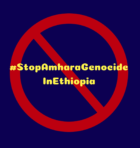Resources
Explore our Resources page to learn about important issues, like the UN’s worry about a growing genocide risk in Ethiopia and thoughts on Amhara’s challenges. Find out about the upcoming Ethiopian Constitutional Conference, which aims to solve problems and bring peace. Stay informed about events shaping Ethiopia’s future.
Ethiopian Crisis Update: Warning of Genocide and News Perspectives
The increasing threat of genocide in Ethiopia worries UN Special Advisor Alice Wairimu Nderitu. There are reports of ongoing violence in Tigray, Amhara, Afar, and Oromia regions that have raised concerns. Families have been harmed, and whole communities have had to leave their homes due to terrible crimes. The UN is urgently asking for action to stop these mass killings, rapes, and displacements. A recent report also pointed out insults and mean words targeting different ethnic groups, making the risk of genocide even higher. The Special Adviser is calling for the violence to stop and for those responsible to be held accountable to prevent more terrible things from happening.
Five Thoughts Motivated by the Amhara War
This writing talks about the troubles in Amhara and how the words used in war are essential. It mentions how the problems keep happening, even though we say “Never again.” It talks about how big groups like the UN and EU need to improve at keeping people safe. The writing ends by saying there are big differences in how people think, and this makes it hard to fix the problems in the region. It wants to understand more about the issues in Amhara and why it’s not easy to solve them.
Publication from the Diasporan Ethiopian Constitutional Conference
In Ethiopia, where over 120 million people live, there’s a big problem that the world shouldn’t ignore. The Amhara people are facing genocide, and Ethiopia is a crucial country for stability in the Horn of Africa. Ethiopia is going through many challenging situations like civil war, ethnic cleansing, hunger, and corruption. Because of the fighting, many people didn’t have enough food, and the government’s corruption made the United States and other countries stop helping. Ethiopian-American groups are having a meeting on November 6 to talk about these issues. They want to change the rules in Ethiopia’s government to bring peace and help the country grow.
At the meeting, different groups will discuss how to make things better. They will talk about changing the Ethiopian Constitution to stop things that make people fight. The conference is crucial because it can help Ethiopia become a peaceful and prosperous place. Representatives from the U.S. government and the African Union will be there to listen and learn about what’s happening in Ethiopia.
The most recent motto of Ethiopia’s Nobel Peace Prize winner is “everything to the war front.”
There is a lot of concern because Colonel Abiy Ahmed, the winner of the Nobel Peace Prize from Ethiopia, is accused of genocide against his people. Despite earlier acts of genocide against the Somali, Gugi, and Amhara communities, Abiy Ahmed was awarded the Nobel Prize, prompting calls for reconsideration. His recent actions, marked by a severe genocidal war on the Amhara, reveal flaws in the Nobel committee’s decision. Despite the ongoing atrocities, especially in the US, there seems to be support for Abiy Ahmed, raising concerns about how the Nobel Peace Prize addresses ethnic cleansing and its true purpose.

